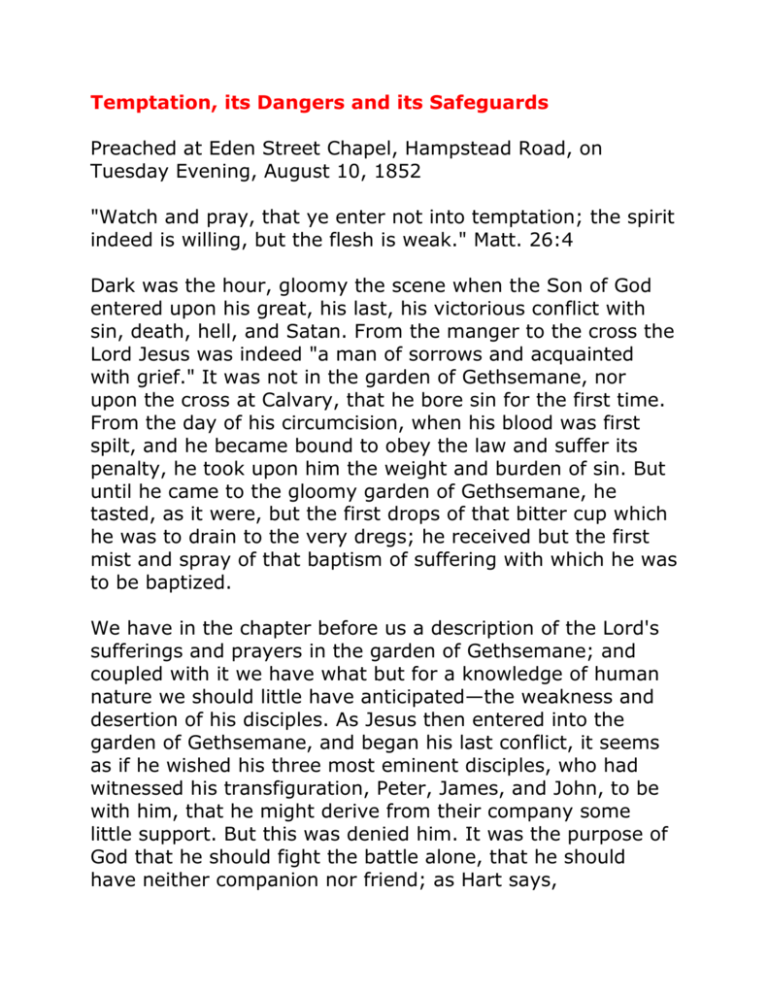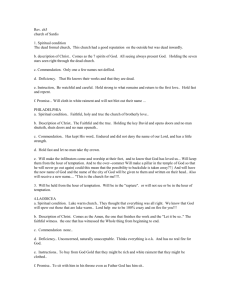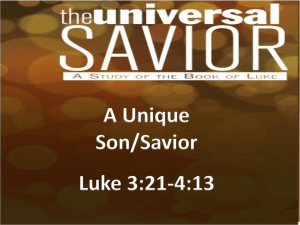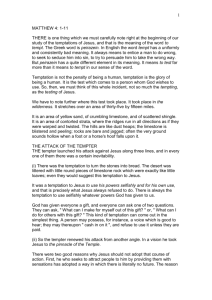JCP112
advertisement

Temptation, its Dangers and its Safeguards Preached at Eden Street Chapel, Hampstead Road, on Tuesday Evening, August 10, 1852 "Watch and pray, that ye enter not into temptation; the spirit indeed is willing, but the flesh is weak." Matt. 26:4 Dark was the hour, gloomy the scene when the Son of God entered upon his great, his last, his victorious conflict with sin, death, hell, and Satan. From the manger to the cross the Lord Jesus was indeed "a man of sorrows and acquainted with grief." It was not in the garden of Gethsemane, nor upon the cross at Calvary, that he bore sin for the first time. From the day of his circumcision, when his blood was first spilt, and he became bound to obey the law and suffer its penalty, he took upon him the weight and burden of sin. But until he came to the gloomy garden of Gethsemane, he tasted, as it were, but the first drops of that bitter cup which he was to drain to the very dregs; he received but the first mist and spray of that baptism of suffering with which he was to be baptized. We have in the chapter before us a description of the Lord's sufferings and prayers in the garden of Gethsemane; and coupled with it we have what but for a knowledge of human nature we should little have anticipated—the weakness and desertion of his disciples. As Jesus then entered into the garden of Gethsemane, and began his last conflict, it seems as if he wished his three most eminent disciples, who had witnessed his transfiguration, Peter, James, and John, to be with him, that he might derive from their company some little support. But this was denied him. It was the purpose of God that he should fight the battle alone, that he should have neither companion nor friend; as Hart says, "Our Captain fought the field alone." It was desirable for the edification of the church in all time that there should be witnesses of this scene of suffering, that they might be able to say not only "that which we have heard," but that also "which we have seen with our eyes, which we have looked upon," of the sufferings and sorrows of the incarnate Word, "that declare we unto you." He therefore takes with him Peter and the two sons of Zebedee to be eyewitnesses of his sufferings, and, if God so willed, to derive some support and help from their presence. But the throes of sorrow commence as he enters the gloomy garden. "He began to be very sorrowful and very heavy," that is, dejected and sad, borne down and overwhelmed with distress. "Then saith he unto them, My soul is exceeding sorrowful, even unto death; tarry ye here and watch with me." As a woman in labour has monitory pangs before the great struggle, so it was with Jesus. The monitory pangs of that great struggle which he had to endure with sin, death, and hell, now came upon him; and we find him leaving the three favoured disciples, as he had before left the main body, bidding them watch, for the place and the hour was not one for sleep or negligence. The law slumbered not, for the cry of God to it was, "Awake, O sword, against my Shepherd." Satan slumbered not, for it was "the hour of the power of darkness." Angels slumbered not, for one was despatched from heaven to strengthen Jesus in his agony. Bad men slumbered not, for in the hall of Caiaphas they were plotting his destruction. Judas slumbered not, for they were numbering into his palm the price of blood. When the enemies of Immanuel were thus awake, should his friends sleep? "Ye cannot help me," might the Lord say, "ye cannot share the battle with me; but surely ye can watch with me, and deny your eyes their wonted slumber." But no; he was to drink the cup of sorrow to the very dregs, and one ingredient of it was that he was to be forsaken of man as well as abandoned of God. When, therefore, he had bidden them watch, "he went a little further, and fell on his face, saying, O my Father, if it be possible, let this cup pass from me." Here we see the weakness of Christ's human nature. There was a time when he said, "I have a baptism to be baptised with; and how am I straitened till it be accomplished!" But now the weakness of this humanity showed itself; and it was this which made him so earnestly pray, as the Apostle speaks, "Who in the days of his flesh, when he had offered up prayers and supplications with strong crying and tears unto him that was able to save him from death, and was heard in that he feared." The Father heard his cries, and though it was not his will that the cup should pass away, he gave him resignation to bear it: "Nevertheless, not as I will, but as thou wilt." We read that "he cometh unto his disciples, and findeth them asleep." O what is man! These who had been his companions and brethren, these who ought to have been the first and foremost in watchfulness as they were in pre-eminence, who had been specially selected to be vigilant and wakeful, who should have been ready to succour and sympathise—that friends like these should sleep when foes were awake, that faithful disciples should slumber when a traitorous disciple was giving neither sleep to his eyes nor slumber to his eyelids—well may we be amazed at their inconsistency! When he comes, then, and finds them asleep, he saith unto Peter, in that beautiful, touching language of rebuke, yet not of complaint, "What, could ye not watch one hour?" "What, ye, my disciples, sharers of my sufferings here and destined partakers of my glory hereafter; who are to be apostles to preach my gospel, and, if need be, to suffer martyrdom for my sake; could ye not watch with me one hour?" And then he adds, in the words of the text, "Watch and pray, that ye enter not into temptation; the spirit indeed is willing, but the flesh is weak." But the words admit of a wider range than the occasion of which they were spoken; they are not only suitable to the slumbering disciples, but to all who are exposed to temptation, and need to be preserved from it. Four things, I think, constitute the leading features of the text, I. Temptation. II. Entrance into temptation. III. Preservatives from temptation—watchfulness and prayer. IV. Motives why we should watch and pray; the willingness of the spirit, and the weakness of the flesh. I.—Temptation is the common lot of God's people; it is a warfare from which none of Christ's soldiers are exempt. The Captain of our salvation had to fight this great battle, and his soldiers have to fight under his command against the same formidable enemy. James says, "My brethren, count it all joy when ye fall into divers temptations;" and again, "Blessed is the man who endureth temptation; for when he is tried he shall receive the crown of life." The Lord also said to his disciples, "Ye are they which have continued with me in my temptations, and I appoint unto you a kingdom as my Father hath appointed to me." But temptation, though the common lot of God's family, is indeed in itself a thing most dangerous and most to be dreaded; and by none is it feared so much as by those who know their own weakness against it. i. Looking at temptations generally we may divide them into two classes; temptations which are distressing, and temptations which are enticing. Both are dangerous, yet those temptations which entice are more dangerous than those which distress. But temptation, whether to distress or allure, would have no power over us if there were not that in our hearts which listens to it and has a natural affinity with it. Satan tempted the Lord Jesus. In Matt. 3 we have an express account of those Satanic temptations; and we read in Luke 4 that when Satan ceased to tempt him he departed from him "for a season." The Lord Jesus, however, could say what we cannot, "The prince of this world cometh and hath nothing in me." If we had no nature susceptible of temptation, no heart akin to it, no combustible materials in the bosom for the match of temptation to set on fire, we need not dread its approach. But what makes temptation to be temptation to us, is that we have that in our hearts which is allied to it. Temptation without and sin within are like the positive and negative electricity of which philosophers speak; if they do but approach they leap to each other; thence the lightning's flash, thence the thunder's roar, thence the rushing hailstorm, and overwhelming shower. It is mutual affinity which gives temptation such fearful power. 1. It is evident from Scripture that Satan has great power in tempting us to evil; he is therefore called emphatically "the tempter," "when the tempter came to him;" "lest by any means the tempter have tempted you." For instance, he provoked, or stirred up David to number Israel; tempted Job to curse God and die; sifted Peter; and entered into Judas. But as he generally tempts by working on the corruptions of our nature, the question has been sometimes asked whether we can always or often distinguish between those temptations which spring from our own evil heart and those which are presented or infused by Satan himself. In some cases I believe we can; in others I believe we cannot. Some temptations, I have observed, are of a distressing kind; for instance, infidel doubts as to whether the Scriptures be of divine inspiration, whether Jesus be the Son of God and God, whether religion itself be not altogether a delusion, whether there be such a thing as the inward work of the Spirit upon the soul; such "fiery darts," as the Scripture calls them, seem to come specially from Satan; and however firmly fixed a man's creed may be in the truth of God, he is not always proof against such suggestions, nor free from such insinuations. Suggestions of this kind, plied by Satan, would, but for the grace of God uproot a soul from its very foundation. But a lever needs a fulcrum, a point of support, a firm solid spot on which it may rest. Infidel suspicions are Satan's lever, and strong is the hand that grasps the power; but its fulcrum, its point of support, is the human heart, for there is in our fallen nature a deep-rooted infidelity, on which Satan places his engine of attack. There is a traitor in the garrison ready to yield at the first summons, "an evil heart of unbelief," a braggart in peace, and a coward in war; he is therefore rarely found out until the day of battle. Many children of God, till called by grace, are utterly ignorant that they possess by nature an infidel heart; and those who in days of unregeneracy never doubted the Scriptures have been shaken to their very centre about them after God has begun his work of grace upon their souls. 2. Again, many of God's children are deeply harassed by blasphemous insinuations and imaginations, which are better hinted at than described—what Hart justly calls "Masterpieces of hell." These bear upon them the footmark of the foul fiend, wallowing now in the darkness of hell as once he sat in the glorious brightness of heaven. Satan, from whose fiendish nature such abominations alone could come, would if he could, gladly persuade the poor distressed child of God, that these are the deliberate thoughts of his own mind. In the blacksmith's forge the back ugly nozzle is hidden that blows up the flame; the pickpocket will sometimes thrust the stolen watch into the pocket of an innocent man. So Satan, hiding himself in darkness, blows up the flame; so would he gladly make the child of God an accomplice in his crime, and a partner of his guilt. He would make him believe that these thoughts are his own, that he gave birth to them, that he consents to them, and therefore lies under the awful condemnation of them. But the very circumstance that these things distress the mind is a proof that they come from Satan. And I will give you another proof; these distressing suggestions have a remarkable, and at first sight unaccountable circumstance attending them— they do not, when they have passed away, leave great guilt upon the conscience. They are like a flash of lightning when we are in bed in a dark night; it may awaken or alarm us, but it passes away without damage, leaving only a momentary surprise or fright. So these fearful insinuations flash into the mind and fill it with horror; but when gone, whatever darkness they may occasion, they lay no weight of guilt upon the conscience; they distress, deeply distress the soul, yet leave no burden behind, such as an indulged lust or angry word would produce. This is a proof that they are not the birth of our own mind or will, but are arrows from the infernal archer in the places of drawing water, fiery darts from spiritual wickedness in high places. 3. Some of God's children Satan tempts to believe that they have committed the unpardonable sin; and others he urges to blaspheme God and to speak appalling words against the Holy Spirit. 4. Others he drives well nigh to despair, plagues them night and day, and urges them on to suicide and self-destruction by telling them that there is no use attempting to live, for they will certainly be his when they die. Now these temptations, though they acutely distress the soul, and have driven some of God's children into a madhouse, are not the most dangerous, because there is in the heart of a child of God a principle of holy abhorrence whereby these fearful insinuations are rejected. They are not drunk down nor eagerly swallowed, and thus do not become theirs. Their nature, tendency, and end, are foreign to the soul. They are intruders, interlopers, not natives of the soil; outlandish villain, not home-bred, domestic rogues. Their speech betrayeth them; and by the life of Pharaoh they are spies come out to see the nakedness of the land. ii. But the other class of temptations are not distressing, but enticing, and from that very circumstance they are the more dangerous. How strong in many are the lusts of the flesh! What power they have over the imagination! And how seductive they become, if in the least degree indulged, till the heart becomes a cage of unclean birds! The lust of the flesh and the lust of the eye have sunk many a poor child of God into the deepest bondage. But besides these grosser and more sensual temptations which make many a poor child of God deeply sigh and groan, what temptations does the world present! There are two worlds, the reflex and counterpart of each other, the world without and the world within; for what is the world but a collection of human hearts? The tiger in the den is of the same breed as all the tigers in the jungle. There is everything, then, in the world without to act upon the world within. The electric battery in London moves the needle in Edinburgh. The maxims, principles, and spirit of the ungodly world act upon the needle of the soul, and turn it from its right direction. Hence the danger of any connection with the world. It is best to sever the wire at once, and cut off its electric influence. Pride, covetousness, worldly-mindedness, over-anxiety in business, conformity to worldly fashions in dress and furniture, society with those who fear not God; what crying evils are these in our day and generation! II.—But we have now to consider the entering into temptation, which is a different thing from temptation itself. "Watch and pray, that ye enter not into temptation." A temptation presents itself, draws near us, or we draw near to it. If conscience sound an alarm, and we keep, so to speak, to the windward of temptation, we are for the present safe. Temptation is a lee shore on which the wind fiercely blows; it is a coast strewed with a thousand wrecks, and with the bleached bones of innumerable drowned mariners. Keep the ship's head to windward, and she may weather the point; neglect sail and helm, and she will go ashore. David and Joseph were exposed to a similar temptation. David entered into it and fell; Joseph was kept from entering into it and stood. In the country you often see a footpath across a field; if we keep in it we are safe. But we may be tempted by various objects to diverge a little, to gather a flower, or saunter upon the banks of the river, or make a short cut across the fields. Whilst we are in the footpath temptation may be very near, but we have not yet entered into it; we are upon the borders of it, but we have not yet entered into its territory. Few, if any, enter into temptation without falling by it. The fly hovers round the spider's web; to touch it is to enter into it. The bird flies around the fowler's snare; to peck at the bait is to enter the trap. The moth flutters round the candle; to enter the flame is to burn its wings. The Lord's words were not, "watch and pray against temptation," but "that ye enter not into temptation." Few come out of temptation as they entered into it. How clearly James has described the difference between enduring temptation and falling by temptation. He does not say, "Blessed is the man who is free from temptation," but "who endureth temptation." Blessed is the man who is kept in the footpath, who sees temptation on every side, but endures it, is not drawn out of the path by it, for "when he is tried he shall receive a crown of life." He has fought the good fight, won the battle, and shall receive the crown. But he adds, "Let no man say when he is tempted, I am tempted of God." He must not say that the Lord presents temptation to him, and is therefore chargeable with it if he falls. "No," says James, let that thought be abhorred. "God cannot be tempted with evil, neither tempteth he any man. But every man is tempted when he is drawn away of his own lust and enticed." Here it is—our own lust, the inclination of our own carnal mind, the passions and corruptions of our fallen nature—these draw us out of the footpath into the field—these entice, as Delilah enticed Samson. As long as Eve did but look upon the fruit she was safe; and though Satan, in the guise of a serpent, kept urging her to touch and take, until she stretched forth her hand she stood. When the lust of the eye began to work in her mind, she was first drawn, then enticed, and then she took, and ate, and fell. So long as we merely see the temptation, and groan under it, and endure it, without giving way to it, we are safe, at least we are so far uninjured; but as soon as we lust after the forbidden object, and are drawn towards it, and so enticed by it as to close in with it, we fall. James wonderfully describes the fearful chain that links sin and death to temptation, "When lust hath conceived, it bringeth forth sin." Lust is not alone; it has a partner, a paramour, and that is, temptation. When lust and temptation come together there is first a conception. The embryo of sin is engendered in the womb of lust. "The thought of foolishness is sin." The projects and plans for its accomplishment, its heavings and risings, and its strugglings to come forth, manifest the conception of the monster. When conceived, unless mercifully perishing in the womb, there is next a birth: "It bringeth forth sin." The monster is born. Keep temptation and lust asunder, and there is neither conception nor birth. There is no sin in temptation, for the Lord Jesus was "tempted in all points like as we are, yet without sin." Nor in lust is there practical, though there is speculative sin. It is when two meet and embrace, and the will consents to the union, silencing the voice of God and conscience, that sin is produced. And thirdly follows the fearful and fatal fruit, "Sin, when it is finished bringeth forth death;" that is as I understand it, death in the conscience, guilt, condemnation, and misery, and the deadening of all the fruits and graces of the blessed Spirit. III.—But the Lord Jesus gave the sleeping disciples two grand preservatives—"Watch and pray, that ye enter not into temptation." He did not say, "Watch and pray that ye have no temptation;" that could not be, for temptation is the appointed lot of the child of God; but he said, "Watch and pray, that ye enter not into it." The entrance, then, into temptation is the thing to be watched and prayed against. i. But why should the Lord have laid these special injunctions upon their heart and conscience? Because these alone, in the hands of God, could keep them from entering into and falling under the power of temptation. With God's blessing we will examine these two safeguards separately. 1. To "watch" implies having one's eyes open. Here the disciples failed. When they should have had their eyes open they were overcome with sleep. But how are our eyes open? Do the words merely mean opening the eyes as the babe does in the cradle? To keep the eyes open implies something more than lifting up the lids. Does temptation always come in the garb of temptation? Is it known and recognised when it first knocks at the door? Does it never come in the dead of the night muffled up and disguised? It does. We must then know something previously of temptation, in order to recognise it. In this metropolis there is a small, select body of men called the Detective Police. They do not wear usual police dress, nor display any outward mark of their office; their business being to know by sight the London thieves, their haunts and habits, and to learn to detect the feeblest trace of crime. A detective who does not know a thief by sight under the most artful disguises may let him into a place of general concourse from which he should exclude him. So with us and temptation. We must know temptation by sight; we should always have a detective glass at our eye, so as to recognise its features, however disguised, and whatever garb it may assume. If we fail in this, we do not watch. The thief has got in because we did not recognise him. 2. To watch also implies to be upon our guard. How little we are upon our watch-tower! Examine all the slips and falls you have been guilty of, and you may trace them nearly all to one point—being off your guard, descending from the watchtower, or falling asleep in the sentry box. It is being off your guard that allows you to fall into the spirit of the company you may be thrown into, to drop a joke, or to utter words which are justly called "unguarded." When we are upon our watch-tower, alive to the evil of sin, sensible of our weakness, knowing that God has his holy eye upon us, and is able to preserve us, then we are kept out of the snare of the tempter. Temptation may come, but we do not enter into it so long as we are on our guard. 3. Again, watching implies perseverance. The sentinel who sleeps at his post is, by the articles of war, condemned to be shot. It will be no excuse for him to say; "I was awake one hour, or two hours," when the rule required him to be awake the whole time he was standing sentinel. Generally speaking the eyes get heavy with watching; it was so with his disciples. We can scarcely believe that they went to sleep immediately the Lord left them; but their eyes were no doubt gradually overcome with heaviness. We read that Jesus found them "sleeping for sorrow." Like children, they had cried themselves asleep. It is not, then, being merely once or twice upon our guard that will suffice; we must be so constantly if we are to be kept from the power of evil. But who is equal to the continual maintenance of this indispensable safeguard? Is it in the power of the creature thus perseveringly and unceasingly to watch? Can a man put himself on guard in the first instance; or can he ever after keep himself so? It is only as the fear of God is implanted and maintained by an almighty power in a man's soul, that he is either put or kept upon his guard. But the children of God, for the most part, learn lessons painful and yet profitable in this important matter. The burned child dreads the fire. If you have been caught napping, it may make you wakeful for the future. If we sleep we are sure to fall. And yet perhaps the very person who is most sensible of the danger of falling asleep, and most energetic in cautioning others, may himself be the first to nod. An instance occurs to my mind which I read many years ago in "Cook's Voyages." A party had landed in the extreme southern continent, and were ascending a snowy mountain. Dr. Solander, an eminent naturalist, and used to snowy countries, was with them, and he warned them not to go to sleep; "for," said he, "if you sleep you die." He himself, however, was the very first to give way to sleep, and was aroused and saved by the others with the greatest difficulty. How easy is it to warn and caution others! how hard to follow one's own advice and act on one's own caution! And yet after all our watchfulness we must still say, "Except the Lord keep the city, the watchman waketh but in vain." ii. But the Lord added another safeguard—prayer: "Watch and pray, that ye enter not into temptation." This is the grand preservative. If a man do not pray he is on the brink of temptation; if he do not continue praying he will enter into it, and probably fall. Prayer is God's appointed way to keep the soul from entering into temptation. Not that prayer will act as a kind of mysterious charm, to drive it away, as Papists believe that crossing themselves will frighten away Satan. Prayer is only efficacious as enlisting in our defence the God of prayer, as taking hold of his strength and obtaining help from him. Satan, therefore, directs all his artillery against it. For instance, when distressing temptations assault the soul, Satan immediately plies all his artillery against the use of prayer: "You pray! Will God hear you? It is mockery, it is presumption, after your base neglect, rebellion, and ingratitude. You had better not provoke God by it, for you will only increase your eternal condemnation. Look, too, at your prayers; see how wandering and broken they are. Besides, you have no faith to believe that God will answer you; nor can you pray with any consistency. You keep doubting and disbelieving. And what infidel thoughts you have about God hearing your prayers and what a poor bewildered, confused wretch you are! Look, too, at all your sins and backslidings. Will God hear and answer a wretch like you?" Now unless the Lord Jesus were pleased to keep alive the Spirit of supplication which he first freely gave, the voice of prayer would be effectually silenced by all this artillery of hell. Nay, under the pressure of these cruel assaults, it is often silenced in word, but not in spirit; in utterance, but not in feeling; in language, but not in sighs, cries, groans, and tears. Again: temptation, when it becomes very powerful and we enter into it, stops the mouth of prayer. Temptation, if it gain any footing within, and if lust begin to mingle with it, defiles the conscience, and when the conscience is defiled prayer is restrained, and at times almost dumb; for it seems mocking God to call on his name. Now arises a mighty struggle betwixt temptation and the poor tempted soul. Satan presses the temptation on, the flesh hankers after it, as the fish after the worm, coming nearer and nearer to the bait till it is well nigh swallowed. The poor soul is all weakness; but it continues praying, crying, groaning, sighing, seeking deliverance, and yet finding little or none. O how many of the Lord's family are engaged in this hand to hand conflict with sin, death, and hell! But however pressed down with temptation, must they give up for lost, cease to watch, lay aside crying, abandon all approach to the throne of grace? That would please Satan well; that would give great power to temptation; that would be like taking away the battlements as the enemy approach the town, opening the wicket when the foe was thundering at the gates. Resistance to the last is the only thing left. "Ye have not yet resisted unto blood, striving against sin." But this is not in us. Resistance is only as God is pleased to "teach the hands to war and the fingers to fight." But the Lord "knoweth our frame." Though he himself never entered into temptation, for temptation never entered into him, yet was he "in all points tempted like as we are, yet without sin." He therefore can sympathise with us, and "with the temptation can make a way to escape, that we may be able to bear it." IV.—The Lord, therefore, knowing our infirmities, deeply acquainted with our weakness, in the tenderest sympathy of his compassionate heart, though he gently rebuked his slumbering disciples, and set before them the best safeguards, yet mercifully added, "The spirit indeed is willing, but the flesh is weak"—aye, weak as water, unable to stand against the least temptation, except by the special help of God. i. First, there is the weakness of the flesh. Why is flesh so weak? Because it is fallen, because it is sinful, because it has an alliance with the temptation which is presented to it. It is weak against temptation for the same reason that a man who loves strong drink is weak against the offered dram. If we had no inward lusting after evil, no pride, no rebelliousness, no fallen nature, no carnal mind, no vile affections, nothing in us earthly, sensual, or devilish, need we fear temptation? No; for then we should be proof against it; it would be like dipping a match in water. Here our weakness lies. If we could always resist we should conquer, but resist we cannot, except by the special power of God. This is a lesson we all need to learn. The weakness of the flesh manifests itself continually in compliance, in nonresistance, in giving way, in yielding, often almost without a struggle, nay, sometimes in acting a worse and more wicked part still. How striking are the words of Hart! "That mariner's mad part I played, Who sees, yet strikes the shelf." Is there any one here that knows and fears God who can say he has never played that mad part; never seen the rock ahead, and yet run upon it; never mourned, sighed, cried, groaned, and repented, and yet been again overcome; never seen the evil of the snare, never felt the wire round his neck, and yet been entangled, I was going to say strangled? It is through these things that we learn the weakness of the flesh; weak to believe, weak to hope, weak to love, weak to fight, weak to resist, weak to overcome, weak to watch, weak to pray, weak to stand, weak to everything good; strong to everything evil. The flesh indeed is weak. What are all resolutions, all promises, all desires, all endeavours, all strugglings, all strivings, except the soul is held up by the mighty power of God? ii. And yet "the spirit is willing." Here the child of God is distinguished from those who are given up as a prey to temptation. He has a willing spirit, which they have not. But how is the spirit willing? It is made "willing in the day of God's power." It is a new spirit, a holy spirit, a gracious spirit, and therefore a willing spirit. But what is it willing to do? Willing to obey, to watch, to pray, to be conformed to the will of God, to crucify the lusts and affections, to put off the old man and put on the new. And how does it show its willingness? By the very struggles it maintains against the flesh—flesh and spirit pulling contrary ways; the spirit all willingness, the flesh all weakness; flesh twining around, spirit struggling under the firm and strong embrace of flesh. Hence the conflict; the spirit willing to read God's word, to pray and seek God's face, and pour out the heart before him; the flesh weak, and finding prayer a burden. The spirit willing to make sacrifice, endure persecutions, bear afflictions, carry the cross, suffer with Jesus, resist even unto blood, striving against sin; the flesh weak, dragging the spirit down with it, unable to stand a single moment, complying with every suggestion to evil, listening to every insinuation of Satan breathed into the ear, hearkening to the tempter, and almost as bad as he. This then, the willingness of the spirit and the weakness of the flesh, is the reason why there should be watchfulness and prayer. If there were no willing spirit there would be no need of watchfulness; it would be useless; nor of prayer, for it would not ascend with acceptance into the ears of the Lord of Sabaoth. If there were nothing but flesh the believer would be all weakness; possessing spirit, there is in him some willingness, and this God looks at. Contrast for a moment the case of Judas with that of Peter. There we see this matter brought out in its true colouring. The flesh of Judas was weak, and he fell under the power of temptation, which took full possession of his heart when he received the sop. He fell through the power of covetousness and of enmity against the Lord Jesus. He neither watched nor prayed, for he possessed neither watchfulness nor prayer; he fell, therefore, finally and everlastingly. Peter's flesh was weak; he was sifted like corn in a sieve, riddled to and fro, unable to withstand the temptation presented to him; yet he had a willing spirit, loved the Lord, and believed in his holy name. His heart was sound and right, and his spirit willing, but his flesh was weak. He could not stand against the power of temptation; he quailed at the question of a servant girl. But how different the ends of Judas and Peter! The one fell, not being upheld, for he was the son of perdition, and fell to rise no more; the other fell through weakness, yet was possessed of a willing spirit, that struggled in his bosom labouring for the mastery, and through the power of grace gained the day. The Lord Jesus prayed for him that his faith might not fail; and thus, though he fell in the hour of temptation, he fell not finally. But Peter learned some great and profitable lessons from his temptation. It winnowed pharisaism out of his heart; it cut to pieces all his creature strength; it laid the great man, the prince of the apostles, low. Peter entered into the temptation a giant, and came out of the trial a little child. We shall do the same if we know anything of the power of temptation. Nothing brings down the heart like it; nothing lays the soul so low in the dust before God as to know the power of sin through the power of temptation. Nothing so effectually roots out self-righteousness; nothing makes the grace of God so precious; nothing so much enhances in value the atoning blood of the Lamb; nothing makes the poor soul cleave with firmer grasp to Christ on Calvary than a deep acquaintance with the power of temptation. And yet the Lord says, "Watch and pray, that ye enter not into temptation." He bade his disciples pray, "Lead us not into temptation." It is well to have temptation; it is ill to enter into temptation. It is well to endure temptation; it is ill to fall beneath temptation. It is well to fight against temptation; it is ill to be defeated by temptation. It is well to suffer, well to groan, well to sigh, well to resist even unto blood; it is ill to be overcome, to be defeated, to be laid low, and in our feelings to be slaughtered by sin and Satan. Now nothing but watchfulness and prayer, the special gifts of God, can ever keep any poor soul from entering into temptation and being overcome by it. I do not believe there is one man in a thousand who comes out of temptation unscathed; no man comes out of it as he goes in. You might as well think of putting your hand into the fire and not be burned, as to go into temptation without being scorched by the fire of temptation. The Lord, therefore, laid this so strongly and warmly upon the heart and conscience of his disciples; "Watch and pray, that ye enter not into temptation"—into the bowels of temptation, into the dominion of temptation, into the strongholds of temptation, into the territories where Satan is master, as king of the power of darkness. For if we enter into temptation and are overcome by it, there the right arm is broken, there the eyes are put out, there the legs are crippled, there the hands are unnerved, there the knees are loosened, and all the joints paralysed. It is one thing to walk by the brink of the river, and another to fall headlong into it. It is one thing to be annoyed by the stench from a filthy sewer, and another to stumble into it and smear our garments. It is one thing to walk surrounded by temptation, fearing every moment lest we should fall into it, and another to lie down in its embrace. I was once travelling by the railway, and a gentleman got into the carriage who appeared to have been fishing. He soon took out his book of artificial flies, of which he seemed to have a large and beautiful assortment. As he turned over leaf by leaf, a thought struck my mind as I looked silently on; Ah! here is a fly for every fish that swims, differently made and differently coloured, for different seasons, different weathers and different waters. O what a picture is this of Satan and of his book of artificial flies! How that angler for souls has a fly for every fish! How he knows exactly what fly to dance before our eyes! And when he handles his rod with all the artifice of which he is so complete a master, what but the grace of God can keep us from swallowing the hook? Well, then, may we pray, "lead us not into temptation." And may it be our sweet and blessed experience to be able to watch and pray, that we enter not into it. But if, through the weakness of the flesh, we do enter into it, and feel the miserable consequences, may we ever bear in mind that if there be a willing spirit, God, who knows the weakness of our flesh, regards this willing spirit, hears the groans of the poor captive and the cries of the prisoner that under the power of temptation so often feels himself appointed to die.








